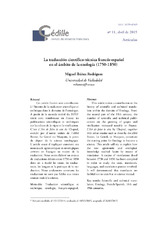La traducción científico-técnica francés-español en el ámbito de la enología (1750-1850)
Autor
Ibáñez Rodríguez, Miguel
Editor
UCOPressFecha
2015Materia
Traduction scientifique et techniqueOenologie
Français-espagnol
XVIIIe et XIXe siècles
Scientific and technical translation
Enology
French-Spanish
18th and 19th centuries
METS:
Mostrar el registro METSPREMIS:
Mostrar el registro PREMISMetadatos
Mostrar el registro completo del ítemResumen
Cet article fournit une contribution à l´histoire de la traduction scientifique et technique dans le domaine de l´oenologie. À partir de la seconde moitié du XVIIIe siècle sont nombreuses en France les publications scientifiques et techniques sur la culture de la vigne et la vinification. C´est L´Art de faire le vin de Chaptal, enrichi par d´autres traités de l´abbé Rozier, Le Gentil ou Maupain, le point de départ de la science oenologique. L´article essaie d´expliquer comment ces nouveautés agronomiques et oenologiques arrivent en Espagne au moyen de la traduction. Nous avons élaboré un corpus de traductions éditées entre 1750 et 1850 dont on a étudié les textes, les traducteurs, les langues et la poétique de la traduction. Nous analyserons comment les traducteurs ne sont pas fidèles aux textes sources mais à la science. This article makes a contribution to the history of scientific and technical translation within the domain of Enology. From the second part of the 18th century, the number of scientific and technical publications on the growing of grapes and vinification increased notably in France. L’Art de faire le vin, by Chaptal, together with other treaties such as those by the abbé Rozier, Le Gentil, or Maupain, constitute the starting point for Enology to become a science. This article will try to explain how the new agronomic and enological knowledge reached Spain by means of translation. A corpus of translations dated between 1750 and 1850 has been compiled in order to study the texts, translators, languages, and translation poetics involved. It will demonstrated that translators are faithful not to texts but to science instead.

